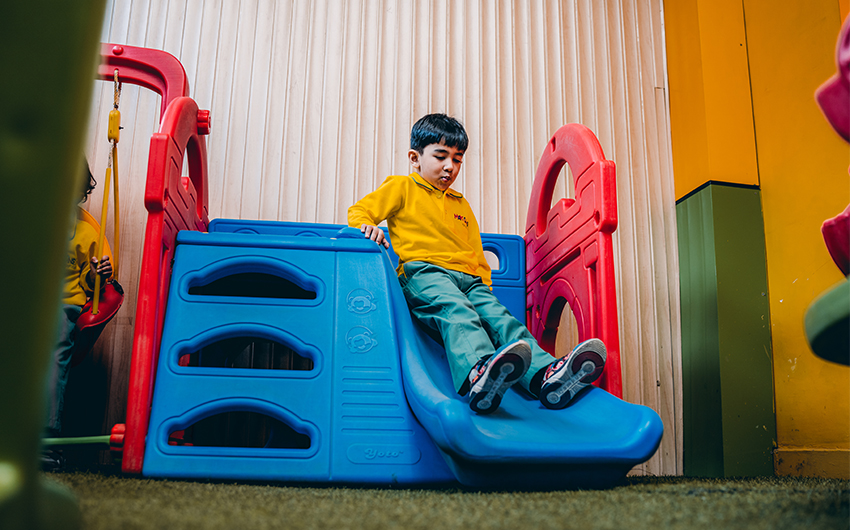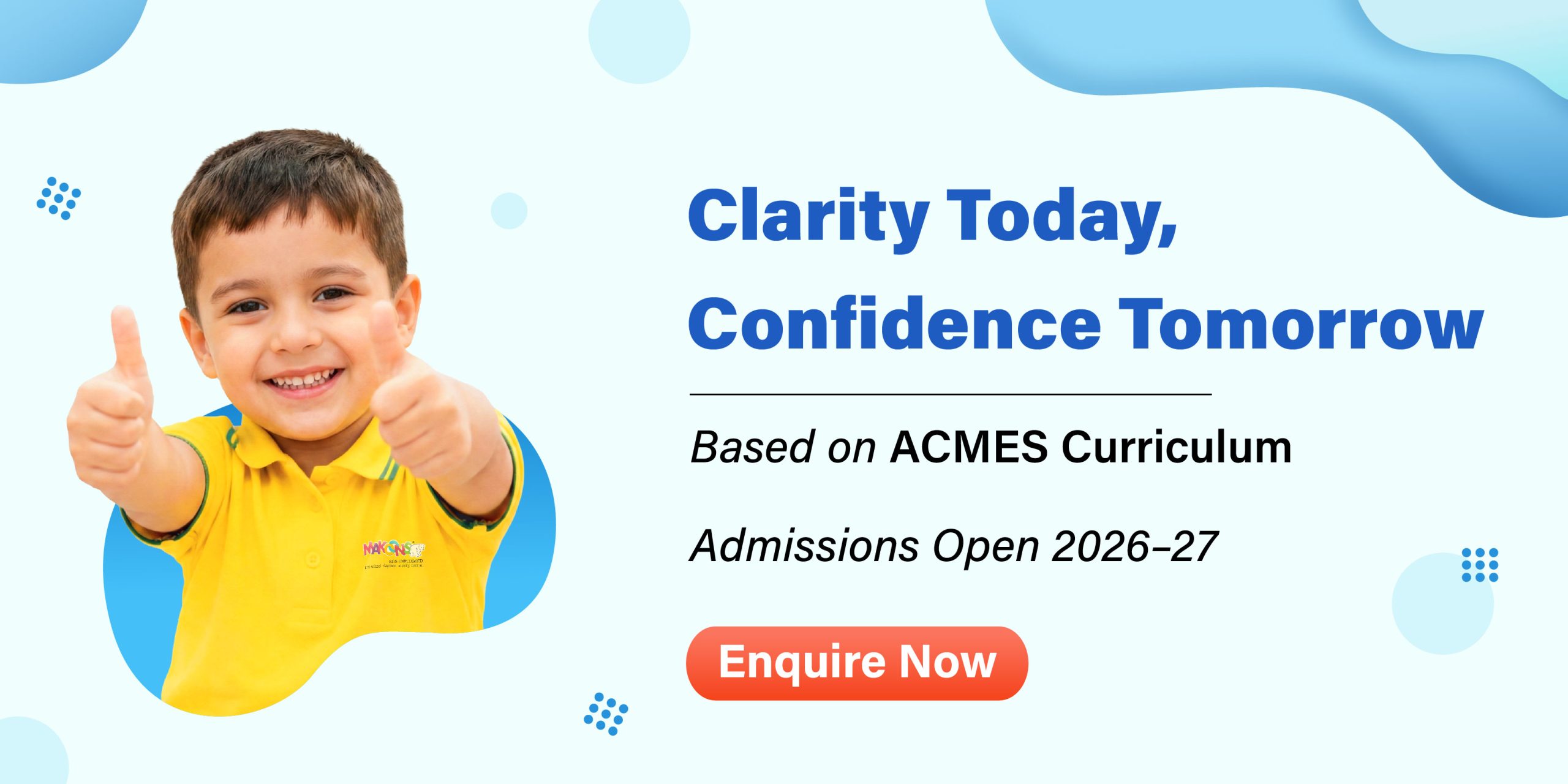As parents, choosing the right early education for your child is crucial. But with terms like “playschool” and “preschool” often used interchangeably, it can be confusing to understand the difference between play school & preschool. This guide will help clarify the distinction between playschool and preschool, helping you make an informed decision for your child’s educational journey with Makoons.
Understanding Playschool
Playschool is an informal setting where children, typically aged 1.5 to 3 years, are introduced to a structured environment outside their home. The primary focus of playschool is on play-based learning, allowing children to develop social skills, motor abilities, and basic communication. The activities in playschool (playschool preschool difference) are centred around fun and engagement, rather than structured academics.
Key Characteristics of Playschool
- Age Group: 1.5 to 3 years
- Focus: Play-based learning
- Environment: Informal, nurturing
- Activities: Games, storytelling, music, and free play
- Objective: Develop social and motor skills
Understanding Preschool
Preschool is a more structured educational environment designed for children aged 3 to 5 years. The preschool curriculum (playschool preschool difference) is designed to prepare children for kindergarten by introducing them to basic concepts in literacy, numeracy, and general knowledge. While play is still a significant part of preschool, there is a stronger emphasis on academic readiness.
Key Characteristics of Preschool:
- Age Group: 3 to 5 years
- Focus: Academic readiness
- Environment: structured, educational
- Activities: Early literacy, numeracy, arts, and structured play
- Objective: Prepare children for formal schooling
Difference Between Playschool and Preschool
While both playschool vs preschool serve as important early childhood education settings, they differ significantly in purpose, structure, and age group. Here are the main difference between play school & preschool:
Age Group
Playschool caters to younger children (1.5 to 3 years), whereas preschool is for older toddlers (3 to 5 years).
Focus
Playschool focuses on play-based learning, while preschool emphasizes academic readiness.
Structure
Playschool is more informal with flexible routines, whereas preschool follows a more structured curriculum.
Activities
Playschool activities are centered around play, creativity, and social interaction. In contrast, preschool activities include basic academic concepts, structured play, and preparatory lessons for kindergarten.
The Benefits of Playschool
In this race of playschool vs preschool, let’s talk about the benefits of Playschool:
Social Skill Development
Playschool provides a nurturing environment where children can interact with peers, helping them develop essential social skills like sharing, cooperation, and communication.
Enhanced Motor Skills
Through various play-based activities, children in playschool improve their fine and gross motor skills, which are crucial for their overall physical development.
Creative Expression
Playschool encourages creative play, allowing children to explore their imagination through art, music, storytelling, and role-playing.
Introduction to Routine
Attending playschool helps young children get accustomed to a daily routine, which can ease the transition to more structured educational settings later on.
Emotional Development
Children in playschool learn to express and manage their emotions in a supportive environment, which fosters emotional intelligence and resilience.
Confidence Building
Participating in group activities and achieving small tasks in playschool helps boost a child’s self-confidence and independence.
The Benefits of Preschool
While talking about playschool vs preschool, we need to learn the advantages of Preschool:
Academic Foundation
Preschool introduces children to basic academic concepts such as letters, numbers, shapes, and colors, laying a strong foundation for future learning.
Cognitive Skill Enhancement
Through structured activities and educational games, preschool helps enhance cognitive skills like problem-solving, critical thinking, and memory.
Preparation for Kindergarten
Preschool prepares children for the transition to kindergarten by familiarizing them with a structured classroom environment, academic routines, and social expectations.
Language Development
Preschool activities, including reading and storytelling, significantly contribute to the development of language and communication skills.
Social Interaction
In preschool, children continue to develop social skills by interacting with peers, learning to work in groups, and understanding the importance of cooperation and respect.
Emotional and Behavioral Growth
Preschool helps children develop emotional regulation, patience, and the ability to follow instructions, which are important for success in school and beyond.
Why Choosing the Right Option Matters
Choosing between playschool and preschool depends on your child’s age, developmental stage, and readiness for a structured learning environment. Playschool is ideal for younger children who need to develop basic social and motor skills in a nurturing environment. On the other hand, preschool is suited for children ready to begin learning foundational academic skills in preparation for kindergarten. And Makoons have many opportunities here in this race of differences between playschool and preschool.
FAQs
Is preschool necessary before kindergarten?
Preschool is not mandatory, but it helps children prepare for the structured environment of kindergarten by introducing them to basic academic concepts and routines.
Can a child go directly to preschool without attending playschool?
Yes, a child can go directly to preschool without attending playschool. Playschool is optional and primarily focuses on social and motor skill development through play.
How do I decide if my child should attend playschool vs preschool?
Consider your child’s age, developmental stage, and readiness for structured learning. If your child is younger and needs to develop basic social skills, playschool may be a better fit. Preschool is a good choice if your child is ready to start learning basic academic concepts.
Do 2 year olds play with other kids?
At 2 years old, children mostly engage in parallel play. This means they play next to other kids and may imitate or observe them, but they don’t usually play together with a shared goal yet.
How many hours should a 2 year old play?
A 2-year-old should have 1–3 hours of play a day, broken into short sessions of 15–30 minutes.
What is a red flag in child development?
A red flag is a sign that a child may be behind in growth, learning, or skills and might need professional help.
Is 9pm too late for a 2 year old?
Yes, 9 PM is generally too late for a 2-year-old. Most toddlers need 10–12 hours of sleep at night, so bedtime is usually around 7–8 PM.


